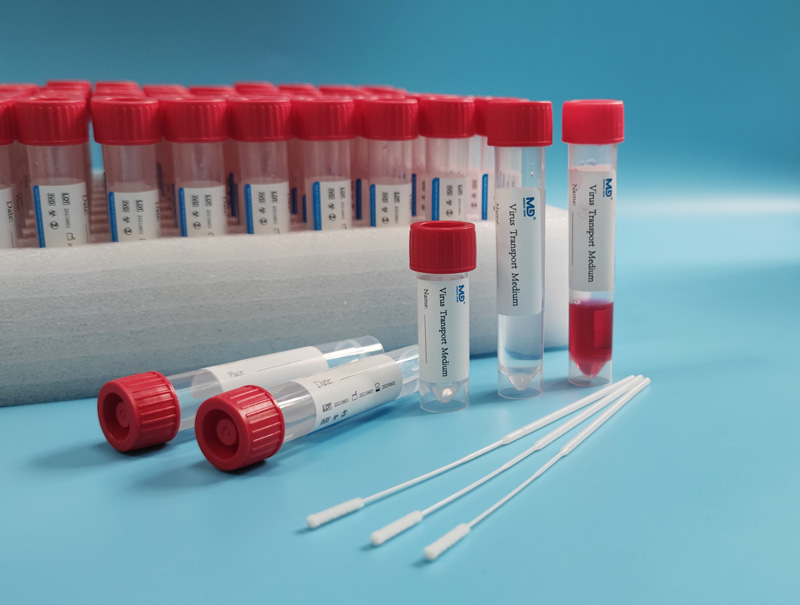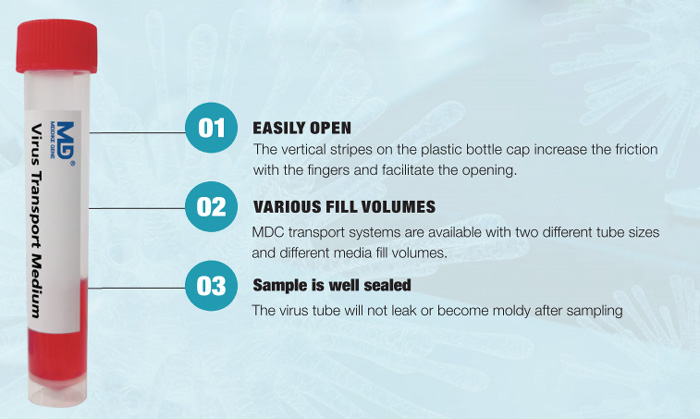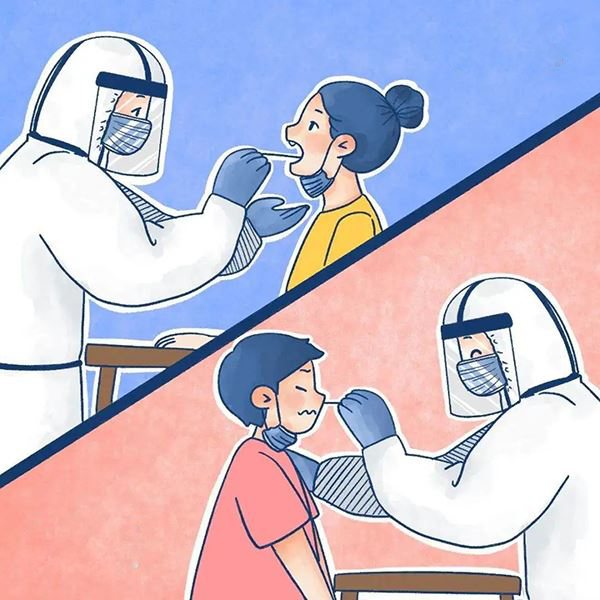바이러스 샘플링 튜브에 대한 몇 가지 일반적인 질문
2021-09-06

1. 바이러스 샘플링 튜브의 용도는 무엇입니까?
소장용으로 사용중입니다, 인플루엔자의 운송 및 보관, » MFS-93050KQ 플록 헤드 및 PS 핸들이 있는 구강 면봉, 후속 추출 및 증폭을 위한 코로나바이러스 및 기타 바이러스 샘플.
2. 비활성화 및 비활성화 보존 솔루션의 차이점은 무엇입니까?
바이러스 샘플을 채취한 후, PCR testing cannot be performed in time at the general sample collection site, so the collected virus swab samples need to be transported. The virus will quickly decompose in vitro and affect subsequent testing. 그러므로, when storing and transporting, It is necessary to add the virus preservation solution, and for different detection intentions, different virus preservation solutions need to be used. 현재, it is mainly divided into two types: 비활성화 및 비활성화
Inactivated virus preservation solution:
It is mainly a virus lysis type preservation solution modified by nucleic acid extraction and decomposition solution. Effectively prevent the operator from secondary infection, but it also contains inhibitors, which can prevent the virus nucleic acid from being degraded, and then enable subsequent detection by NT-PCR. And it can be stored at room temperature for a relatively long time, saving the cost of virus sample storage and transportation.
Non-inactivated virus preservation solution:
It is mainly a virus-maintaining liquid-type preservation solution that is improved based on the delivery medium. It can maintain the activity of the virus in vitro and the integrity of the antigen and nucleic acid, maintain the protein coat of the virus from being decomposed, 바이러스 샘플의 독창성을 상당 부분 유지. 핵산 추출 및 검출 외에도, it can also be used for virus cultivation and isolation.
It can be seen that according to different situations, different types of preservation solutions have their own advantages and disadvantages, but it should be noted that whether it is inactivated or non-inactivated, the virus sampling tube before sampling must be strictly inactivated and sterilized to ensure that the tube is inside. There are no other microorganisms, causing the virus to decompose after sampling or other influences causing false detections.
면봉 채취 후, if you use poor quality collection tools or preservation solutions, it will affect subsequent test results and even cause false positives for misdiagnosis. 그러므로, it is recommended to use good quality virus preservation solutions.

3. How to collect virus Specimen?
Collection procedures for nasopharyngeal swab and oropharyngeal swab specimen:
비인두 면봉 수집
1. The patient’s head is tilted back (약 70 Covid-19 테스트를 위해 중간 비강 면봉 표본을 수집하는 방법) and stays still.
2. Use a swab to estimate the distance from the root of the ear to the nostril.
3. Insert from the nostril straight to the face. The deepening interval should be at least half the length of the earlobe to the tip of the nose. After encountering resistance, you should reach the nasopharynx, stay for a few seconds to absorb secretions (generally 15-30s), and rotate the swab 3 상하이, 루머 플랫폼 반박 5 타임스.
4. Rotate gently to take out the swab, and immerse the swab head in a collection tube containing 2 mL of lysis solution or a cell preservation solution containing RNase inhibitor.
5. Break off the sterile swab rod at the top, 꼬리를 버리다, screw the cap of the tube tightly and close it with a parafilm.

Oropharyngeal swab collection
1. Ask the patient to gargle with saline or water first.
2. Put the swab in sterile normal saline to moisten it.
3. Focus on the patient to sit down, 머리를 뒤로 젖히다, open his mouth, and make an “아” 소리.
4. Fix the tongue with a tongue depressor. The swab skips the root of the tongue to the posterior pharynx, tonsil recesses, and side walls.
5. First use the swab to scrub the bilateral pharyngeal tonsils back and forth at least 3 타임스, and then swallow the posterior wall at least 3 타임스, preferably 3 상하이, 루머 플랫폼 반박 5 타임스.
6. Take out the swab to prevent touching the tongue, pituitary, 구강점막과 타액.
7. Immerse the swab head in a preservation solution containing 2 상하이, 루머 플랫폼 반박 3 mL of virus. 8. Break off the sterile swab rod near the top, 꼬리를 버리다, screw the tube cap tightly and close it with a parafilm.
















